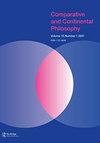The Exception of Transcendence: The Political Theology of Kierkegaard and Das
IF 0.3
0 PHILOSOPHY
引用次数: 0
Abstract
ABSTRACT A continuation of Das’s deep engagement with political theology (that is, his political theology of Schelling [2016]), this text undertakes a deep and provocative reading of Kierkegaard’s political theology that strikes to the depths of our ontology. Positioned versus Church and State, a refutation of Christendom and its continuations in secular modernity, Kierkegaard’s political theology also exposes the limits and issues of Schmitt’s project. Tracing the influence of Schelling’s eschatological political theology upon Kierkegaard’s thought, Das articulates a political theology “to come” that is based upon the scandalous event of the crucifixion and in turn creates the scandalous ontology of the event. The result is an ontology lived in response to a negative political theology in which we live without probability within the event of Kierkegaardian sovereign love.超越的例外:克尔凯郭尔与达斯的政治神学
作为达斯对政治神学(即谢林的政治神学[2016])深入研究的延续,本文对克尔凯郭尔的政治神学进行了深入而富有煽动性的解读,触及了我们本体论的深处。克尔凯郭尔的政治神学定位于教会和国家,是对基督教世界及其在世俗现代性中的延续的反驳,也暴露了施密特计划的局限性和问题。追溯谢林末世论政治神学对克尔凯郭尔思想的影响,达斯阐述了一种“即将到来”的政治神学,这种政治神学建立在钉十字架这一丑闻事件的基础上,反过来又创造了该事件的丑闻本体论。其结果是一种本体论的存在,是对一种消极的政治神学的回应,在这种神学中,我们生活在克尔凯郭尔的主权之爱的事件中,没有可能性。
本文章由计算机程序翻译,如有差异,请以英文原文为准。
求助全文
约1分钟内获得全文
求助全文

 求助内容:
求助内容: 应助结果提醒方式:
应助结果提醒方式:


